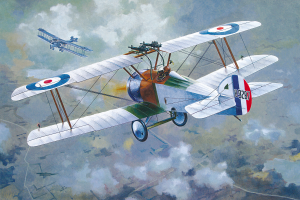
SKU: ROD51
When the raids of the German Zeppelins and strategic bombers against the British Isles began, this new military tactic did not pose any great threat from the point of view of financial or human losses, but they had an enormous psychological impact. Britain could never have felt absolutely safe, despite being apart from continental Europe; but the press highlighted every new raid by the German aircraft as examples of the helplessness of the government to protect His Majesty's citizens. Great Britain was the first in the world to make a comprehensive review of the use of aviation in the defense of its own territory. As a result it created its own anti-aircraft force, Home Defence. At first, out-of-date aircraft were passed to newly formed Home Defence units, machines which by now could not compete with the latest enemy fighters; and also various unsuccessful types, built in small numbers, and sometimes even prototypes or pre-production machines. Gradually, in the course of testing new tactics, it became obvious that Home Defence needed its own specialized aircraft. For their first attempt, there was a rebuild of the two-seat multi-purpose Sopwith 11/2 Strutter into a single-seat interceptor, which pilots gave the ironic nickname of the Comic Fighter, due to its helplessness in air combat and weak flying performance. The appearance of one of the best fighters of that period, the Sopwith F.1 Camel, and its employment in Home Defence tasks, encouraged the designers to modify it as an interceptor. The cockpit was displaced to the rear to improve the pilot's view, the machine guns were removed from the fuselage to the top wing (for this purpose a Foster mounting was used) and minor changes were made to the construction of the fuselage. This was the same basic Sopwith F.1 Camel; however, it was somewhat different from the standard fighter. The type received its semi-official name - Sopwith F.1/3 Comic - probably thanks to its slight similarity to its predecessor Comic Fighter based on the Sopwith 11/2 Strutter.?In comparison with the standard model, there were not many of this modification produced (no more than 100-150 aircraft from different sources). All machines were immediately delivered to Home Defence squadrons. They did not achieve any famous victories, and they were very quickly forgotten, being overshadowed by their famous relative the Sopwith F.1 Camel; however the Sopwith F.1/3 Comic represented a specialized concept of airplane-destroyer, becoming a basis for the development of more modern types in the future for Home Defence purposes.
